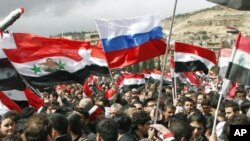In Egypt, Hosni Mubarak's long-trusted military helped force him from office. In Libya, top officials scrambled to distance themselves from Moammar Gadhafi almost from the start. Tunisia's Zine el-Abidine Ben Ali fled his country within weeks, while in Yemen, Ali Abdullah Saleh took his time. But he, too, prodded by neighboring countries, is now in exile.
Syria's president, on the other hand, shows few signs of going anywhere. As his military routs rebel forces in Homs and Idlib, intercepted emails appear to reveal his wife furniture shopping for their Damascus home.
Ruthless system built to last
Assad may derive some of his confidence from a system built by his father, Hafez al-Assad, that has let the family stay in power for the past 40 years.
“This regime came about as a result of a coup in 1970 and was designed from the beginning to resist rebellion, to resist coups,” explains Paul Salem, director of the Carnegie Middle East Center.
The elder Assad established an intricate web of often overlapping intelligence services, separate entities that means even the watchers are being watched. Like his son, he staffed key positions with members of his Alawite minority, warning them, as well as minority Christians and Druze, of the perils of an unleashed Sunni majority.
The result, so far, has been a coherent center, with the highest civilian defection being a deputy oil minister this month, nearly a year into the uprising.
“Its internal intelligence service keeps an eye on officers and officials that might defect, and tries to prevent them or to block that from happening. So, indeed, the defections are still quite minor,” Salem says.
Defections only at lower levels
Where there have been defections is from the lower ranks of the military, often Sunni conscripts unwilling to shoot civilians in villages and cities much like their own. These defectors make up the bulk of the rebels' Free Syrian Army, a group that leading opposition member Haitham al-Maleh said is the only one capable of taking on the government.
“They want to defend themselves and there is no way this regime will not stop by politics, by peaceful [means]. They must be stopped by force,” says al-Maleh.
With the international community at odds about even political condemnations of the Assad regime, the chances of a U.N.-backed intervention as in Libya appear slim. Al-Maleh argues the least the international community can do is give the Free Syrian Army weapons.
Abdul Aziz Saqr, head of the Gulf Research Council, said weapons are important, but are only part of the equation.
“You can't fight an organized military with a Kalashnikov [Russian rifle, AK-47] or a pistol. You need to have anti-tank missiles, you need to have real reconnaissance and intelligence information," says Saqr. "If the Russian satellite reconnaissance has been supplying the Syrian military with a lot of reconnaissance, the Free Army needs to have real intelligence information to be able to help them organize their movements."
Russia plays prominent role
The role of Russia, a major arms supplier to the Syrian government, highlights what is likely one of the biggest differences in Syria's uprising - the heightened stakes of players both regionally and globally. Syria is one of Russia's last allies in the region, and is loathe to let the U.S. or Western powers take the lead again as they did in Libya.
“For us in the region, we believe Russia winning over Syria is Russia winning over the U.S. in Syria,” Saqr says.
And Washington, while supporting the opposition with words, has been slow to act, warning of the complexities of intervention, including the lack even of front lines.
The conflict also comes as the U.S. tries to deal with nuclear and other issues with Iran, which supports Syria as a linchpin of non-Sunni influence in the region and a gateway to Iranian proxy Hezbollah.
Vested interests in the status quo can be found in other nations in the region, including Israel, which fears a fundamentalist takeover in Syria should Assad go.
“Syria is a strong military domestic security regime with a neighborhood that is not willing to take a position against it, like Jordan, Lebanon, Iraq, Turkey. So the geopolitics and the relations with the neighborhood have also played a significant role for not making it easy for any military or external effort," said Saqr.
Last year, predictions that Assad's government would go the way of his counterparts in Egypt and elsewhere were common: “inevitable” and “imminent” were words often bandied about. Inevitable is still used by many, but imminent has all but disappeared.
| Join the conversation on our social journalism site - Middle East Voices. Follow our Middle East reports on Twitter and discuss them on our Facebook page. |












